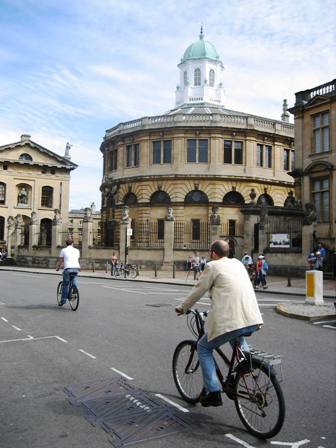
A Broad view: Oxford holds its breath
Edition number 31; dateline 1 June 2010
So much to do and so much time to have done it
There is a moment in the Oxford calendar, a short period of a few weeks in the last dregs of the summer, when calm settles on the city. The groups of language students and most of the tourists have gone home. The students have yet to come up for the start of term. The traffic on the Broad is reduced to a few people ambling and pedalling on their way somewhere, and the buildings of the city seem to be holding their breath in a moment’s repose before the next show begins. I wonder if the rest of the country might be having such a moment now. The excitement of the general election is behind us and the new MPs are finding their hooks. A new austerity is coming but, like a phoney war, the promised threat is still waiting some way off. The hyperbole of the football season has eased back in readiness for a renewed outpouring of fervour during the World Cup. Having lived in Oxford for almost 20 years, I am acutely aware that one must enjoy these moments of respite while one can. Learn to recognise them and savour them when they appear. Before you realise it, any sense of calm that you might feel is mitigated by the knowledge that the crowds will return, the whistle will blow to start the game and the chancellor of the exchequer will stay true to the instincts of his class. In a moment you are back into the hurly burly of day-to-day living and the fleeting quietness is a memory.
At the start of June the calendar tells us that the official start of summer is still a few weeks away but already I have the feeling that I must get everything done before the arrival of July and August renders almost everyone absent or invisible. With summer still to arrive I have a feeling of busyness and a sense that there is so much to do. This feeling hit me again while listening to John Amaechi at the CCPR national conference. Amaechi is an impressive man, not just for his physical stature (that of a giant) and his balanced grace (that of a professional athlete), but for the sense of contained power that he carries. His powerful message, deeply felt and passionately held, was calmly delivered. I was left to wonder how he kept his temper while listening to Gordon Taylor fumble his way through a justification of the actions and inactions of professional football in response to the issues of racism and homophobia. Taylor looked like a man who had just realised that someone had put a powerful hallucinogenic in his drink but, with the room turning and changing around him, it was too late to do anything about it now. Amaechi held the look of polite bemusement at what was unfolding before him and only hinted at what must surely have been a rasping exasperation below the surface.
The report of the conference is elsewhere in this issue but part of Amaechi’s message was that while sport can do what it decides to do much of what it does it does unthinkingly. Take for an example, he said, when someone builds a leisure or community facility in London that is not readily accessible from the tube network. By this simple act of planning or finance or social modelling, you automatically put a facility out of the reach of a significant minority of people within the city. The same will hold true for other towns and cities around the country. It is something that David Lloyd Leisure realises all too well. The TLR news pages report that the company has officially found it “shocking” that a significant minority of children do not enjoy the benefits of parental support for out-of-school sporting activities. The RAC Foundation, that most Clarksonesque of lobbying organisations, weighs in with the calculation that because 80% of households have access to a car that access to a car is the norm. Amaechi’s message also included the challenge that while it was now unacceptable to be racist people are still being slighted by casual comments and actions every day because of their gender or their sexuality. As he delivered his message in London the press in the US were poring over photographs of Elena Kagan, now solicitor general and nominee for the US supreme court but then a college student, playing softball. This photograph, published in the Wall Street Journal (prop. Mr R Murdoch), was, we were told, cause for extensive speculation over whether Ms Kagan might be gay.
Without wishing the summer away, I am looking forward to the quiet weeks when Oxford holds its breath but for now there is so much to be done.Jonathan Ives
Editor
letter from the editor
The Leisure Review editorial
